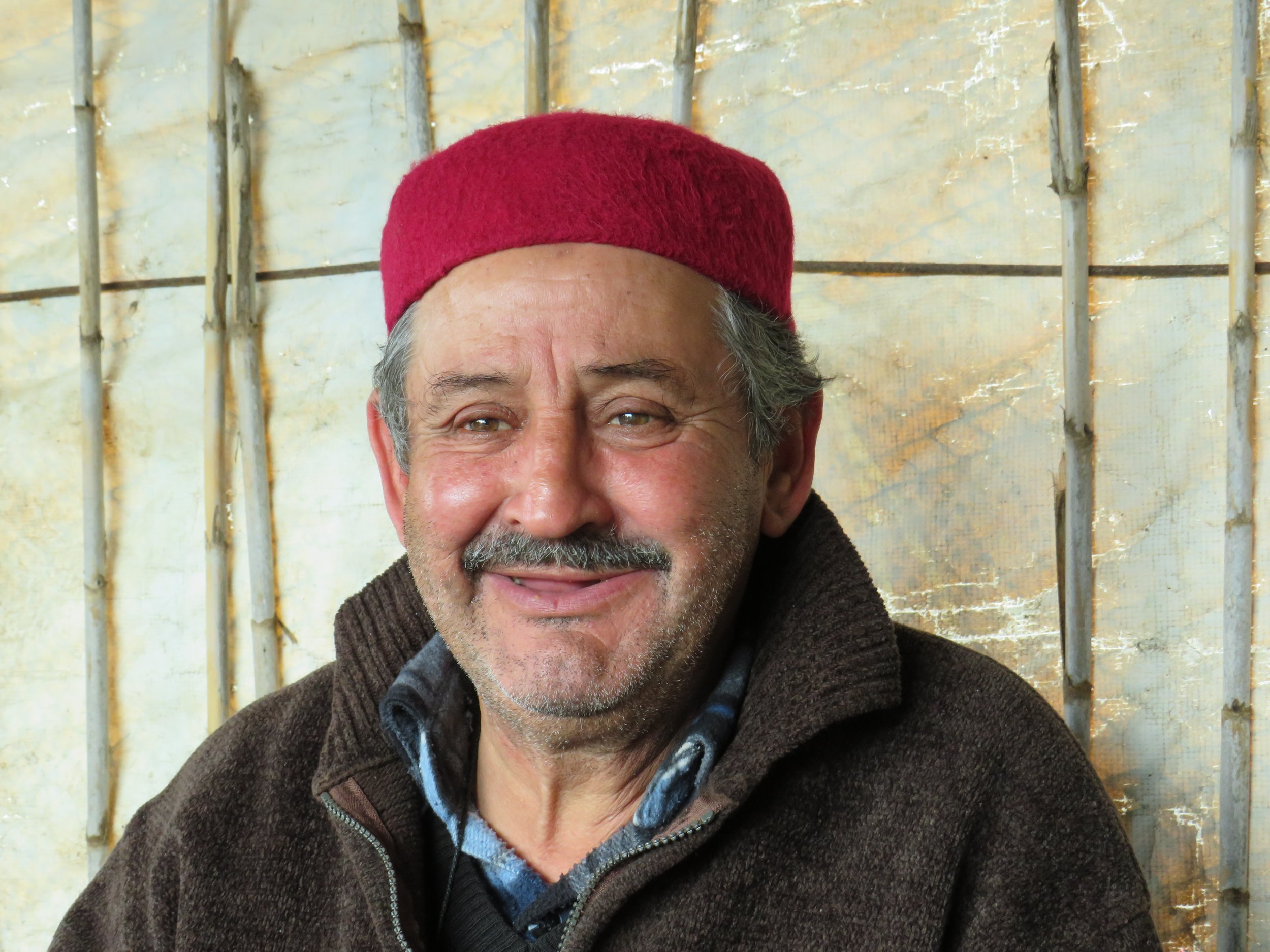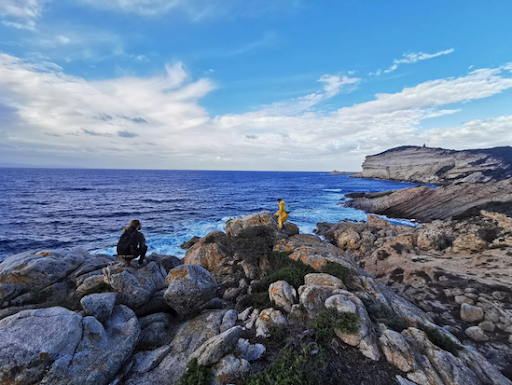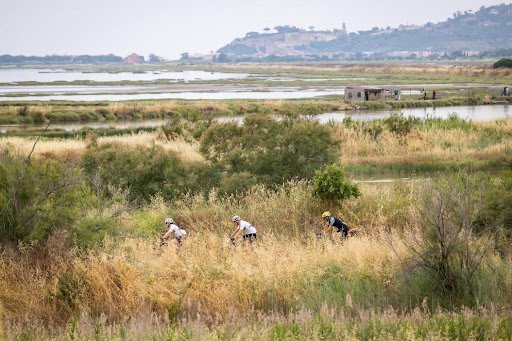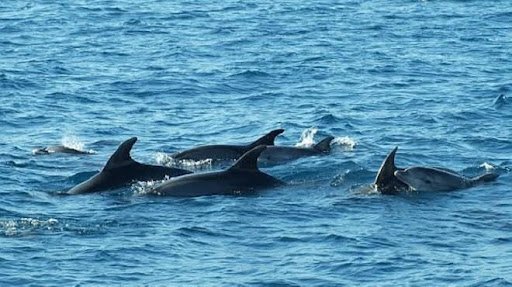Coastal Views, Bouches de Bonifacio, Corsica, France
Mediterranean coastlines have long been a magnet for tourists seeking sun, sea, and cultural experiences. However, mass tourism trends have taken a toll on the region’s important natural ecosystems. In response to these challenges, the REBOOT MED Project, a 24-month flagship initiative, emerged to reshape the tourism sector and create sustainable eco/blue tourism products across six Western Mediterranean countries: France, Italy, Spain, Tunisia, Morocco, and Mauritania.
Given its extensive experience and established model and tools for ecotourism development in the Mediterranean, MEET Network was a natural choice to bring in to support the project’s pilot regions. Beyond this, one of the REBOOT MED’s overarching goals is for the tourism being developed to support the implementation of a sustainable blue economy, generating growth, job creation, and enhancing living environments for both residents and tourists, which strongly aligns with MEET’s values and the Network’s goals.
MEET Network’s Role
MEET is putting its experience at the service local stakeholders in each REBOOT MED destination, helping them to develop tourism experiences and packages that have a positive impact on the environment and local communities. To that end, MEET is expanding its existing tools. To-date, MEET has developed a Methodology and Guidelines for the Development of Eco/Blue Economy Tourism Products and provide mentoring support to the pilot destinations via regional technical assistants. MEET also led the development of a Joint Methodology for the Animation of the Co-Design Labs, to support the co-design approach being used by the project pilot destinations to design and develop tourism products. Additionally, MEET has also been working alongside the Global Footprint Network, which is supporting efforts to measure the ecological footprint of each tourism product developed in REBOOT MED project.
Bikers in Grosseto, Tuscany, Italy © Tuscanytrail
The product development guidelines MEET has developed for REBOOT MED project are inspired by the MEET Manual and MEET’s experiences in the ENI CBC Med MEET project, and the Interreg MED projects DestiMED and DestiMED PLUS. However, unlike the approach suggested in the MEET Manual, the REBOOT MED guidelines focus specifically on best practices for ecotourism development in coastal communities using a co-design approach.
Importantly, the guidelines have also been developed as an adaptable tool that addresses the wide scope of products being developed in REBOOT MED, from single tourism activities or one-day experiences, to complete multi-day tourism packages.
Eco/Blue Tourism Products in the Pipeline
Over the past months, MEET has worked alongside the REBOOT MED pilot destinations on a range of ecotourism products, each one offering a unique experience that showcases the rich cultural and natural heritage of the Western Mediterranean. Here’s a taste of what’s in the pipeline:
In Bonifacio, Corsica, visitors can explore cliffs on foot or horseback, meet local craftspeople, delve into permaculture, and savour carefully prepared local dishes.
One experience in Valinco Valley, Corsica, is focused on maritime heritage and fishing. While another seamlessly blends team building, ecological awareness, and water-based activities in small groups.
Sunset Walk in Campomoro, Valinco Valley, Corsica, France
In Sciacca, Sicily, an immersive itinerary has been developed giving tourists the opportunity to travel from land to sea in a celebration of historic neighbourhoods.
While the coastal area of Grosseto, Tuscany, Italy, invites visitors to embark on birdwatching experiences along the migratory birds’ route, walk wilderness trails, and cycle through the Diaccia Botrona Reserve.
In the Balearic Islands, Spain, a week-long experience is being developed which combines sailing and biking. Like all of the products, there is a strong focus on environmental awareness. In this case, a collaboration has been established with a local NGO to ensure the experience supports plastic waste removal.
Tétouan-Oued Laou, Morocco, boasts a unique scuba diving experience with a focus on coral reefs in one product, and another offers tourists the chance to explore traditional fishing practices in Oued Laou, featuring sea and river adventures.
Dolphin Watching, Pescatourism Experience, Tétouan-Oued Laou, Morocco
The pilot destination Al Hoceima, in Morocco, is developing a product that combines traditional fishing with ecological practices and local crafts. They are also creating a culinary-themed experience and a slow travel experience, including meditation, yoga, and time allocated for biodiversity appreciation.
Through its ecotourism experience, the National Park of Diawling, in Mauritania, will showcase ancestral knowledge and cultural heritage, by offering tourists the opportunity to learn about traditional mat manufacturing.
Making Local Crafts, Diawling National Park, Mauritania
In Tabarka, Tunisia, an ecotourism experience that highlights the natural, cultural, and community heritage of the region, is being co-created with local fishermen and producers.
Finally, Ghar el Melh, Tunisia, is developing a boutique ecotourism experience that combines adventure, culture, and conservation, with a focus on local historic monuments and local traditions.
Local, Ghar El Melh Wetland Reserve, Tunisia
In addition to supporting the product development component, MEET will also be contributing to other project activities including the development of policy recommendations, and the monitoring and assessment of tourism products.
Expected Results
The anticipated outcomes of REBOOT MED are comprehensive, aiming to create durable partnerships, develop policy pathways, resume tourism services, increase tourist activities involving local enterprises, raise awareness of the Western Mediterranean as a sustainable destination, and foster public-private partnerships, start-ups, investments, and job creation.
Local Delicacies, Bouches de Bonifacio, Corsica, France
Project Partnership
The project boasts a strong collaboration among partners, including Petra Patrimonia Corsica, PRISM Impresa Sociale s.r.l, CPMR Intermediterranean Commission, ASCAME, F.A.R. Maremma, WWF, Agencia Estrategia Turistica Balears, Chambre de Commerce d’Industrie et de Services Tanger, and Parc National Du Diawling, among others. The project is funded by the European Maritime, Fisheries and Aquaculture Fund (EMFAF).
For more information about REBOOT MED Project, visit the website.









